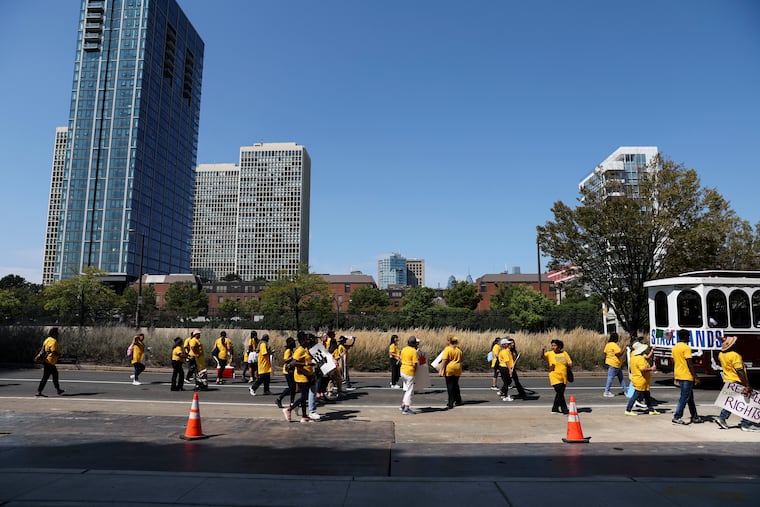Nannies, house cleaners, and caregivers will soon get more rights in the workplace in N.J.
A new law creates privacy rights, wage protections and mandatory breaks for an estimated 50,000 workers in the Garden State once it is signed by Gov. Phil Murphy.

Nannies, house cleaners, and caregivers in New Jersey, an estimated 50,000 workers, will soon gain new protections in their workplaces.
The New Jersey Domestic Worker Bill of Rights passed in the state’s General Assembly on Monday, and is now awaiting Gov. Phil Murphy’s signature. Under the new law, domestic workers would no longer be excluded from New Jersey’s Law Against Discrimination and the state’s wage and hour law.
Evelyn Saz, a former home care worker and an organizer for the National Domestic Workers Alliance in New Jersey, said wage theft is a common problem among domestic workers. Often, employers will promise a rate of pay, but the actual amount paid will be less, she said, speaking to The Inquirer with a colleague from NDWA who translated between Spanish and English.
In her own time as a home care worker, for four years when she moved to New Jersey from El Salvador, she remembers dealing with discrimination and abuse, including being screamed at and harassed by some of the families she worked for.
“I didn’t come to this country to be treated that way,” Saz said. But she was compelled to stay in the position. “As a single mom, head of household, I couldn’t let go of a patient or leave a case,” she said.
Philadelphia City Council passed a similar bill of rights for domestic workers in 2019, also including the requirement of a written employment contract and periodic rest and meal breaks.
How this helps workers
Under the N.J. bill of rights, domestic workers would gain privacy rights, and their employers would be required to enter into a written contract with any employee who works more than five hours a month. The law will bar employers from keeping original copies of a worker’s personal documents and recording them in bathrooms and living quarters.
Employers would be required to provide paid rest periods and meal breaks, and at least one day off after six days of work. They would also have to give notice of at least two weeks before terminating domestic workers, four weeks for live-in employees.
The law would also create the Domestic Workers Standards and Implementation Board, which will track the bill’s implementation and make policy recommendations. Philadelphia, similarly, has a Domestic Workers Task Force.
The workers covered by the new law would include caretakers of children, the sick, the elderly, and people with disabilities; house cleaners; cooks; gardeners; and other domestic service employees who work within their employer’s residence.
According to the New Jersey Department of Labor and Workforce Development, most domestic workers were already entitled to minimum wage and overtime, but the new law removes an exclusion for part-time babysitters working in the employer’s home. The state’s minimum wage is $15.13 per hour as of Jan. 1, or $13.93 for employers with fewer than six workers.
The larger impact
The National Domestic Workers Alliance, a 501(c) (3) nonprofit, has been pushing for expanded labor rights for house cleaners, nannies, and caretakers throughout the country. Its New Jersey and Pennsylvania chapters pushed for the laws in New Jersey and Philadelphia, respectively.
The NDWA estimates that nearly 2.5 million people are domestic workers in the United States. Domestic worker bills of rights have passed in 10 states, as well as Philadelphia, Seattle, and Washington, D.C.
Saz started working as an organizer with NDWA in late 2020, and left her home care work about a year later to spend more time organizing.
“To see the domestic workers happy for this win signifies a major step in our history,” she said. Still, she noted, “our work is not done. It’s important that we educate domestic workers and employers about this law and about their rights.”